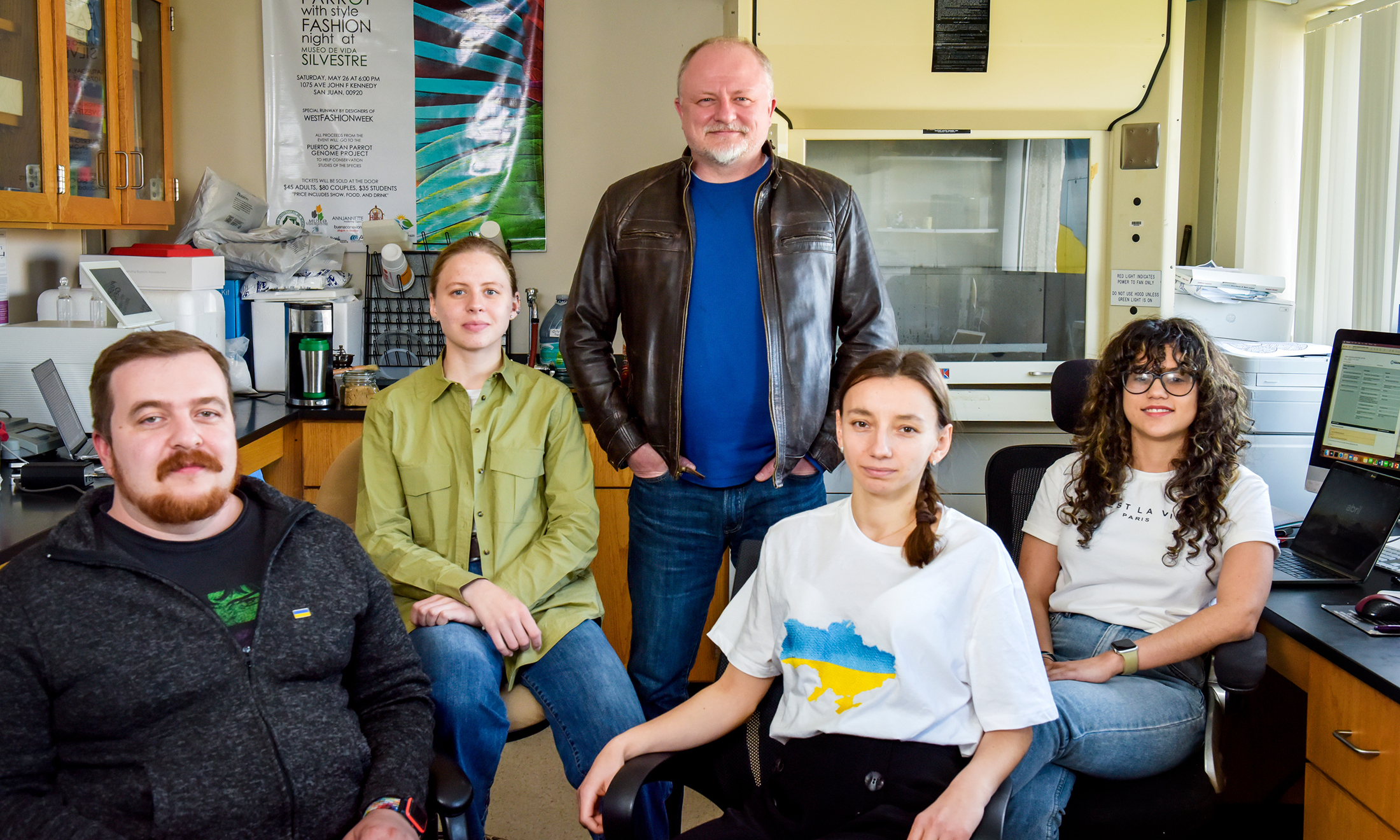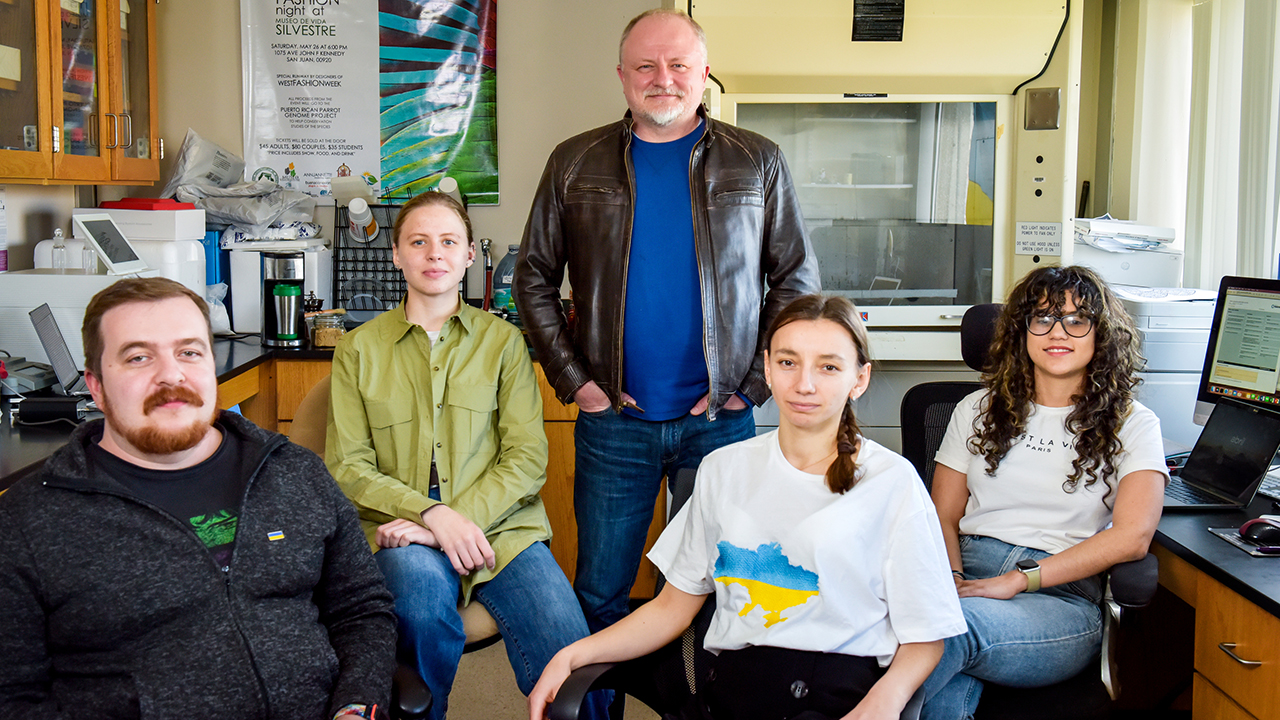Oakland professor creating a genomic database to study Type 1 Diabetes in his native Ukraine thanks to $5.1 million grant

Walter Wolfsberger (postdoctoral fellow), Zlata Bilanyn (exchange student), Taras K. Oleksyk, Maria Varyvoda (volunteer) and Stephanie Castro-Marquez (graduate student).

Oakland Associate Professor of Biology and genomics expert Taras K. Oleksyk, Ph.D. is creating one of the largest genome-wide studies of Type 1 Diabetes in the world, and he’s hopeful his research will provide the data for other scientists to follow.
Discovering a new genetic mutation that causes or protects from disease can become new drug targets that the entire field can pursue.
“We may or may not find the cure for Type 1 Diabetes on our own,” Oleksyk said. “But even if our own analysis won’t give the final answer about the genetic causes of this disease, we will open the doors and pave the way for many researchers to come to the previously uncharted realm of human genomic diversity.
“Similarly to the sailors in the age of geographic discovery and the pioneers of the American West, we are providing directions, maps of genetic information, that others who will follow can use. If not us, one day some clever scientist will do it, and I know we're making it possible.”
Oleksyk is the lead investigator on a $3.28 million grant to Oakland University from The Leona M. and Harry B. Helmsley Charitable Trust to continue his work, “A Comprehensive Study of T1DM Exomes in Ukraine.” This is the second phase of the study, which has been awarded a total of $5.1 million.
“I can’t overemphasize what an amazing opportunity this is thanks to the Helmsley Charitable Trust,” said Oleksyk. “It is an audacious project that takes place in a country that is fighting a foreign invasion. Usually, funding agencies don’t like to take risks, and scientists have to make a very specific case for their research, stating exactly what’s going to happen. After our team demonstrated the capability to deliver real results under difficult circumstances, Helmsley’s gave us their trust and made our research possible.”
The Helmsley Type 1 Diabetes (T1D) Program is the largest private foundation funder in the world with a focus on T1D, with more than $1 billion to date committed to transform the trajectory of the disease and to accelerate access to 21st century care, everywhere.
Oleksyk’s goal is to create a database for studying Type I diabetes and the genomics of his native Ukraine by collecting, extracting DNA and sequencing whole exomes from 20,000 blood samples from across the entire country. Oleksyk said Ukraine and most of Eastern Europe is a “genomic desert,” where not much data is available for the research.
“If you're building a genetic map of the world, that part of the world would be empty,” he said. “How our body responds to disease is largely affected by our genetics. Our genetics is in turn shaped by millions of years of our population’s history, where humans interacted with the environment in which we evolved.
“If you don't have information on a population’s genomes then you really don't know why certain people respond to disease the way they do, or why are there differences in tolerating medications or vaccines,” he added. “The more we learn about local variation in genomic diversity, the more genetic variants involved in diabetes we can identify. Which means there’s a higher chance of personalized approach to treating the disease and less people will suffer.”
Before coming to OU, Oleksyk worked at the University of Puerto Rico, and was part of a research team that collected genomic data in the Caribbean as part of his 1,000 Genome Project. While collecting that data, he realized his own population in Ukraine and Eastern Europe was not well represented.
He and his team began collecting data in Ukraine when he was approached by a group of collaborators working on Type 1 Diabetes genomics around the world.
“They saw that we had an operation in Ukraine where we have built a network of physicians, and could collect samples and deliver genome data,” he said. “They said, ‘We need your team and your network to do this.’ I asked, ‘How many samples they were talking about?’ They suggested 20,000. And that’s just not something anybody has accomplished there before. I could not do this alone. Thankfully, I have a team both in Ukraine and here at Oakland with postdocs Khrystyna Shchubelka and Walter Wolfsberger. When a proposal was developed, we reached out to the Helmsley T1D Program for financial support.”
Oleksyk has a longstanding collaboration with Uzhhorod National University in Ukraine and with his sister Olga Oleksyk, who is a leading endocrinologist expert in her country. Olga Oleksyk recently visited OU and met with the Oakland Provost Dr. Britt Rios-Ellis, Ph.D. to discuss future projects and collaborations.
The research network Oleksyk helped set up in Ukraine includes dozens of doctors, which was important for the study, but proved to be critical before his project even started.
A few weeks before Oleksyk was set to start his work, Russia invaded Ukraine. He said nobody was sure if he could still collect data from Ukraine during a war, but he was still confident he could do it. So, he proposed to divide his project and the grant into two parts. First, they would prove that the study was feasible despite the ongoing invasion of the country. If successful, they would apply for the second grant that would complete the project as planned.
The original goal for the first phase was to collect and sequence the exomes of 2,000 samples of T1D cases and controls in Ukraine.
“Within a year the funding had to be increased because we didn't have 2,000 samples, we had 7,000 of which 2,000 are now fully sequenced for the exomes” Oleksyk said. “We already presented our findings at several major research conferences and started many additional collaborations based on the data we could share. Ukraine is one of the best places to study human genetics, because of the ‘Pioneer advantage’ we have.”
Oleksyk said the most important deliverable of this study is the public release of the huge amount of sequencing data that can be used in future diabetes research. Oleksyk contracted the company Regeneron to sequence the samples and said without their cooperation the project wouldn’t be possible.
Biomedical researchers in academia and pharma alike are looking forward to the results of this study, so they can use genetic clues to develop new and more effective medicines to help patients.
Oleksyk is proud of the work his team has done in the first phase of the grant and is optimistic the second phase will be even more successful.
“I hate that the genomic map of the world still has holes in it,” Oleksyk said. “Diabetes is a terrible, terrible disease and it's on the rise. But now we have the tools that give us hope that we can fight this disease. When the opportunity arises and technology is ready, with genome sequencing and bioinformatics, and given the new capabilities to understand big data provided by A.I., we can sift through the sequences our project will generate and can actually find real answers. We are living in exciting times, because with the technology we possess, we may finally be ready to answer questions that only a few decades ago seemed impossible. So, this is our time, and this is the part that I can do.”


 March 25, 2024
March 25, 2024